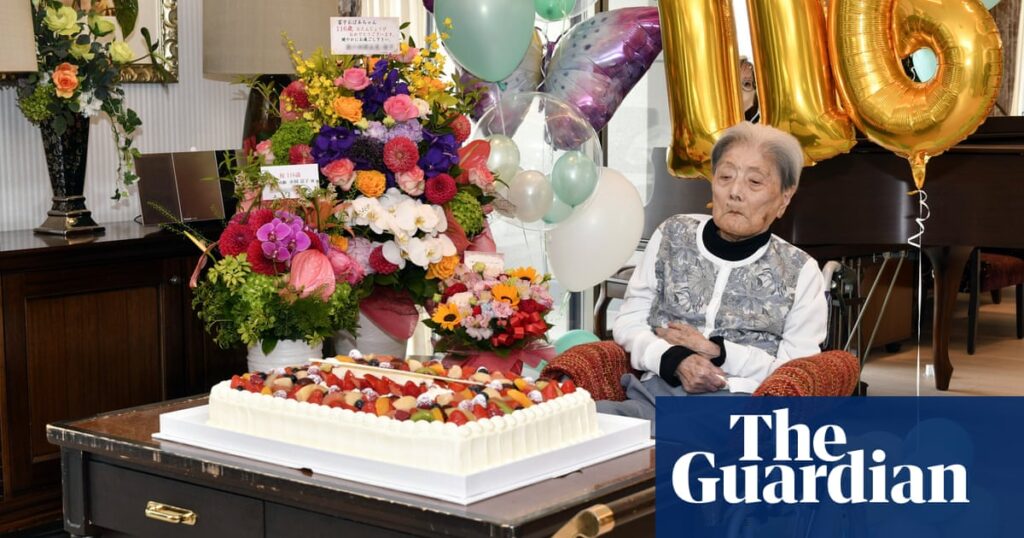The death of the world’s oldest person, Maria Branyas-Morella, aged 117, may have many pondering the secret to extraordinary longevity, but scientists say it may be best to avoid taking longevity advice from centenarians themselves.
According to the Guinness World Records website, Branyas believed the secret to his longevity was “order, peace, good relationships with family and friends, contact with nature, emotional stability, the absence of worries and regrets, lots of positivity, and avoiding toxic people.”
But Richard Faragher, professor of biogerontology at the University of Brighton, said the reality was that scientists were still trying to understand why some people live beyond 100 years old.
Faragher said there are two main theories, which are not mutually exclusive.
First, he says, some people are simply essentially lucky — in other words, even if centenarians have certain habits, it doesn’t mean that those habits promoted their longevity — a logical fallacy known as “survivorship bias.”
“Just because you can smoke 60 cigarettes a day and survive doesn’t mean that smoking 60 cigarettes a day is good for your health,” Faragher said.
The second theory is that centenarians have special genetic traits that allow them to live longer – that is, they are stronger as a result of their genes, he said.
But Faragher said both theories lead to the same warning: “Never take health and lifestyle advice from a 100-year-old.”
“What we see with most centenarians is that, generally speaking, they don’t exercise very much. Their diets tend to be rather unhealthy,” he said, noting that some centenarians are smokers.
“This goes against a lot of epidemiological evidence about how to extend healthy lifespan,” he said, adding that one large study found that not smoking, exercising, drinking moderate amounts of alcohol and eating five servings of fruits and vegetables a day could add up to 14 years to life expectancy.
“fact [centenarians] I do a lot of these unhealthy things and I just get by. [life] They say they are lucky or typically blessed [genetically]” he said.
While Branyas acknowledged that her longevity was down to luck, her daughter Rosa Moretto once said it was down to genetics: “She has never been to the hospital, she has never broken a bone, she is fine, she is not in pain,” Moretto told Catalan television in 2023.
Faragher adds that many of the possible reasons that have been discussed for the longevity of centenarians may actually be examples of reverse causation: For example, the idea that having a positive mental state contributes to longevity may be rooted, at least in part, in people being more optimistic because of good health.
“When was the last time you had a toothache with a really positive mindset?” he said.
The problem, Faragher added, is that when we think about centenarians, we tend to focus on the things that may have helped them survive, “but we don’t consider the factors that may have prevented them from surviving,” he said.
Professor David Gems, a geneticist at University College London, said gender was an important factor in longevity – women age more slowly than men, but one example was natural variation in the rate of ageing – and agreed that luck also played a role.
“I work with nematodes, which only live for a few weeks,” he says. “They’re genetically identical and kept in the same environment, but the first nematodes die of old age after about 10 days, and the last nematodes die after about 30 days.”
But while at an individual level, this could explain why some people are lucky enough to live beyond 100, experts say there are well-known factors that help increase life expectancy at a population level, such as improved healthcare and sanitation.
“Starting about 100 years ago, we began to see large increases in life expectancy due to improvements in reducing child mortality,” said David Sinclair, CEO of the International Longevity Center, noting that much of this was due to the introduction of vaccinations and clean water.
“There will be a similar focus on aging over the last 20 years and over the next 20 years,” Sinclair said, adding that this will also include improvements in flu and shingles vaccines, statins and other medications that help extend life expectancy for older adults.
But governments also need to take steps to help individuals make healthier choices that will ultimately help people live longer, he said, adding that many people live in environments where it is difficult to exercise, eat healthy foods and avoid pollution.
But even if one lives to a triple-digit age, that doesn’t mean life will be filled with balloons and flaming birthday cakes.
As Sinclair points out, while there’s often positive news about centenarians, it also makes clear the challenges they face, such as living alone for many years.
“The reality is not always as good as it seems,” he said.



